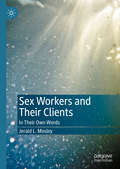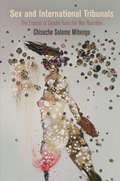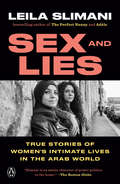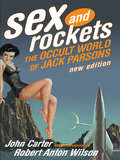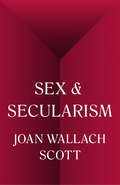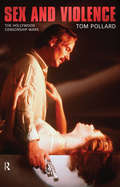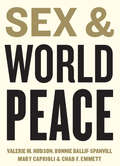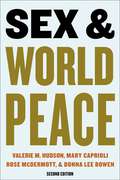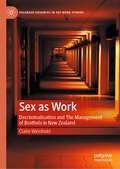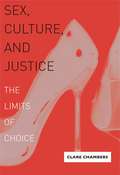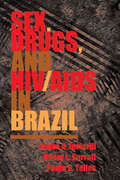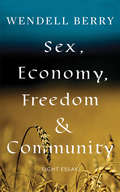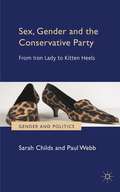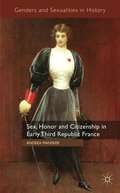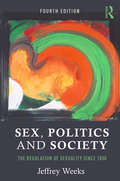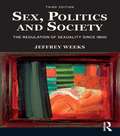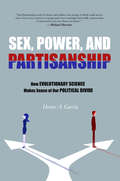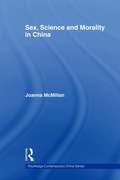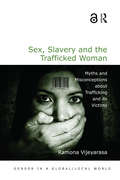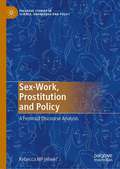- Table View
- List View
Sex Workers and Their Clients: In Their Own Words
by Jerald L. MosleyThis book draws on the voices of sex workers and their clients to critically assess the criminalization of prostitution in favour of decriminalization. It does so by contrasting their voices with the claims made by prohibitionists: those advocating the prohibition of prostitution or, at least, the prohibition of the purchase of sexual services, and notes scholarly research that gives context to those accounts and claims. Each chapter is dedicated to a particular issue which is given currency in academic and public debates on sex work. The first part of each chapter reviews the state of research and publicly-aired contentions and the second part compares sex workers' voices with claims from prohibitionists. It highlights the gap between what many sex workers have to say about themselves and what theorizing prohibitionists say about all prostitution. It argues that there is often a striking contrast in attitude, perspective, interpretation and valuation. This books speaks primarily to prohibitionist thinking and sex work stereotyping and, secondarily, to the debate on decriminalization of sex work.
Sex and Film
by Barry ForshawSex and Film is a frank, comprehensive analysis of the cinema's love affair with the erotic. Forshaw's lively study moves from the sexual abandon of the 1930s to filmmakers' circumvention of censorship, the demolition of taboos by arthouse directors and pornographic films, and an examination of how explicit imagery invaded modern mainstream cinema.
Sex and International Tribunals: The Erasure of Gender from the War Narrative (Pennsylvania Studies in Human Rights)
by Chiseche Salome MibengeBefore the twenty-first century, there was little legal precedent for the prosecution of sexual violence as a war crime. Now, international tribunals have the potential to help make sense of political violence against both men and women; they have the power to uphold victims' claims and to convict the leaders and choreographers of systematic atrocity. However, by privileging certain accounts of violence over others, tribunals more often confirm outmoded gender norms, consigning women to permanent rape victim status.In Sex and International Tribunals, Chiseche Salome Mibenge identifies the cultural assumptions behind the legal profession's claims to impartiality and universality. Focusing on the postwar tribunals in Rwanda and Sierra Leone, Mibenge mines the transcripts of local and supranational criminal trials and truth and reconciliation commissions in order to identify and closely examine legal definitions of forced marriage, sexual enslavement, and the conscription of children that overlook the gendered experiences of armed conflict beyond the mass rape of women and girls. In many cases, a single rape conviction constitutes sufficient proof that gender-based violence has been mainstreamed into the prosecution of war crimes. Drawing on anthropological research in African conflicts, and feminist theory, Mibenge challenges legal narratives that reinscribe essentialized notions of gender in the conduct and resolution of violent conflict and uncovers the suppressed testimonies of men and women who are unwilling or unable to recite the legal scripts that would elevate them to the status of victimhood recognized by an international and humanitarian audience.At a moment when international intervention in conflicts is increasingly an option, Sex and International Tribunals points the way to a more nuanced and just response from courts.
Sex and Lies: True Stories of Women's Intimate Lives in the Arab World
by Leila Slimani"As revealing as Lisa Taddeo's bestseller Three Women, but it has a more urgent political mission." --Evening Standard A fearless exposé of the secrets and lies of women's intimate lives, by the bestselling author of The Perfect Nanny and Adèle "All those in positions of authority--politicians, parents, teachers--maintain the same line: 'Do what you like, but do it in private.' " Leila Slimani was in her native Morocco promoting her novel Adèle, about a woman addicted to sex, when she began meeting women who confided the dark secrets of their sexual lives. In Morocco, adultery, abortion, homosexuality, prostitution, and sex outside of marriage are all punishable by law, and women have only two choices: They can be wives or virgins. Sex and Lies combines vivid, often harrowing testimonies with Slimani's passionate and intelligent commentary to make a galvanizing case for a sexual revolution in the Arab world.
Sex and Rockets
by Robert Anton Wilson John CarterThis remarkable true story about the co-founder of Jet Propulsion Laboratory. By day, Parsons' unorthodox genius created a solid rocket fuel that helped the Allies win World War II. By night, Parsons called himself The Antichrist. "One of the best books of the year."--The Anomalist
Sex and Secularism
by Joan Wallach ScottHow secularism has been used to justify the subordination of womenJoan Wallach Scott’s acclaimed and controversial writings have been foundational for the field of gender history. With Sex and Secularism, Scott challenges one of the central claims of the “clash of civilizations” polemic—the false notion that secularism is a guarantee of gender equality.Drawing on a wealth of scholarship by second-wave feminists and historians of religion, race, and colonialism, Scott shows that the gender equality invoked today as a fundamental and enduring principle was not originally associated with the term “secularism” when it first entered the lexicon in the nineteenth century. In fact, the inequality of the sexes was fundamental to the articulation of the separation of church and state that inaugurated Western modernity. Scott points out that Western nation-states imposed a new order of women’s subordination, assigning them to a feminized familial sphere meant to complement the rational masculine realms of politics and economics. It was not until the question of Islam arose in the late twentieth century that gender equality became a primary feature of the discourse of secularism.Challenging the assertion that secularism has always been synonymous with equality between the sexes, Sex and Secularism reveals how this idea has been used to justify claims of white, Western, and Christian racial and religious superiority and has served to distract our attention from a persistent set of difficulties related to gender difference—ones shared by Western and non-Western cultures alike.
Sex and Violence: The Hollywood Censorship Wars (Media and Power)
by Tom PollardSex and Violence examines the history and social dynamics of film censorship in the United States. It examines censorship controversies throughout film history, from the beginning of cinema in the 1890s to the present. The book focuses both on formal censorship systems, including state and local censorship boards and industry self-regulation efforts, to unofficial censorship rendered by pressure groups and powerful social movements. It probes beneath the official rhetoric and explanations, revealing sensitive, festering controversies. The book critically examines dozens of Hollywood's most controversial (and interesting) movies, focusing on recurring issues and censorship themes. The book reveals the social and political processes of vetting films and their effect on film form and content. In addition, it examines the use of sexuality and violence in movies and the effects of movie censorship on those issues. Finally, it analyzes and makes recommendations for dramatic changes in motion picture ratings.
Sex and World Peace
by Mary Hudson Bonnie Valerie M. Ballif-Spanvill Caprioli Emmett Chad F.Sex and World Peaceunsettles a variety of assumptions in political and security discourse, demonstrating that the security of women is a vital factor in the security of the state and its incidence of conflict and war. The authors compare micro-level gender violence and macro-level state peacefulness in global settings, supporting their findings with detailed analyses and color maps. Harnessing an immense amount of data, they call attention to discrepancies between national laws protecting women and the enforcement of those laws, and they note the adverse effects on state security of abnormal sex ratios favoring males, the practice of polygamy, and inequitable realities in family law, among other gendered aggressions. The authors find that the treatment of women informs human interaction at all levels of society. Their research challenges conventional definitions of security and democracy and shows that the treatment of gender, played out on the world stage, informs the true clash of civilizations. In terms of resolving these injustices, the authors examine top-down and bottom-up approaches to healing wounds of violence against women, as well as ways to rectify inequalities in family law and the lack of parity in decision-making councils. Emphasizing the importance of an R2PW, or state responsibility to protect women, they mount a solid campaign against women's systemic insecurity, which effectively unravels the security of all.
Sex and World Peace
by Valerie Hudson Bonnie Ballif-Spanvill Mary Caprioli Chad EmmettSex and World Peace unsettles a variety of assumptions in political and security discourse, demonstrating that the security of women is a vital factor in the security of the state and its incidence of conflict and war. The authors compare micro-level gender violence and macro-level state peacefulness in global settings, supporting their findings with detailed analyses and color maps. Harnessing an immense amount of data, they call attention to discrepancies between national laws protecting women and the enforcement of those laws, and they note the adverse effects on state security of abnormal sex ratios favoring males, the practice of polygamy, and inequitable realities in family law, among other gendered aggressions. The authors find that the treatment of women informs human interaction at all levels of society. Their research challenges conventional definitions of security and democracy and shows that the treatment of gender, played out on the world stage, informs the true clash of civilizations. In terms of resolving these injustices, the authors examine top-down and bottom-up approaches to healing wounds of violence against women, as well as ways to rectify inequalities in family law and the lack of parity in decision-making councils. Emphasizing the importance of an R2PW, or state responsibility to protect women, they mount a solid campaign against women's systemic insecurity, which effectively unravels the security of all.
Sex and World Peace
by Rose McDermott Valerie Hudson Donna Lee Bowen Mary CaprioliSex and World Peace is a groundbreaking demonstration that the security of women is a vital factor in the occurrence of conflict and war, unsettling a wide range of assumptions in political and security discourse. Harnessing an immense amount of data, it relates microlevel violence against women and macrolevel state peacefulness across global settings.The authors find that the treatment of women informs human interaction at all levels of society. They call attention to the adverse effects on state security of sex-based inequities such as sex ratios favoring males, the practice of polygamy, and lax enforcement of national laws protecting women. Their research challenges conventional definitions of security and democracy and common understandings of the causes of world events. The book considers a range of ways to remedy these injustices, including top-down and bottom-up approaches to redressing violence against women and the lack of sex parity in decision-making. Advocating a state responsibility to protect women, the authors campaign against women’s systemic insecurity, which threatens the security of all.Sex and World Peace has been a go-to book for instructors, advocates, and policy makers since its publication in 2012. Since then, there have been major changes in world affairs, including the #MeToo movement, as well as advances in both theoretical and empirical literature surrounding the subject. This second edition, which adds coauthors Rose McDermott and Donna Lee Bowen alongside Valerie M. Hudson and Mary Caprioli, revises and updates the book for a new generation. The book retains its foundational overview of the relationship between women’s oppression and war, enhanced by fresh data and new material covering recent developments for global women’s rights and analysis of additional examples of gender and conflict throughout the world.
Sex as Work: Decriminalisation and The Management of Brothels in New Zealand (Palgrave Advances in Sex Work Studies)
by Claire WeinholdThis book examines the ways that brothels are managed under decriminalisation in New Zealand. New Zealand decriminalised sex work in 2003 with the passage of the Prostitution Reform Act, making it the first country to do so. Decriminalisation situates brothels as ‘businesses like any other’ and creates a legislative platform for better working conditions for sex workers. Nevertheless, we have limited understanding of how brothels are managed in New Zealand. Drawing on interviews with brothel operators and sex workers, this book explores how the law is understood and implemented, how brothel operators position their businesses, and how they seek legitimacy in a historically stigmatised sector. It also examines the rules and norms by which operators manage their businesses and the possibilities for sex workers to consent to commercial sexual services in the context of neoliberal norms of work and of managers who expect them to be professionalised, responsibilised and productive.
Sex in Peace Operations
by Gabrielle SimmGabrielle Simm's critical re-evaluation of sex between international personnel and local people examines the zero-tolerance policy on sexual exploitation and abuse and its international legal framework. Whereas most preceding studies of the issue have focused exclusively on military peacekeepers, Sex in Peace Operations also covers the private military contractors and humanitarian NGO workers who play increasingly important roles in peace operations. Informed by socio-legal studies, Simm uses three case studies (Bosnia, West Africa and the Democratic Republic of the Congo) to illustrate the extent of the problem and demonstrate that the problems of impunity for sexual crimes are not just a failure of political will but the result of the structural weaknesses of international law in addressing non-state actors. Combining the insights of feminist critique with a regulatory approach to international law, her conclusions will interest scholars of international law, peace and conflict studies, gender and sexuality, and development.
Sex, Culture, and Justice: The Limits of Choice
by Clare ChambersAutonomy is fundamental to liberalism. But autonomous individuals often choose to do things that harm themselves or undermine their equality. In particular, women often choose to participate in practices of sexual inequality—cosmetic surgery, gendered patterns of work and childcare, makeup, restrictive clothing, or the sexual subordination required by membership in certain religious groups. In this book, Clare Chambers argues that this predicament poses a fundamental challenge to many existing liberal and multicultural theories that dominate contemporary political philosophy.Chambers argues that a theory of justice cannot ignore the influence of culture and the role it plays in shaping choices. If cultures shape choices, it is problematic to use those choices as the measure of the justice of the culture. Drawing upon feminist critiques of gender inequality and poststructuralist theories of social construction, she argues that we should accept some of the multicultural claims about the importance of culture in shaping our actions and identities, but that we should reach the opposite normative conclusion to that of multiculturalists and many liberals. Rather than using the idea of social construction to justify cultural respect or protection, we should use it to ground a critical stance toward cultural norms. The book presents radical proposals for state action to promote sexual and cultural justice.
Sex, Culture, and Justice: The Limits of Choice (G - Reference, Information and Interdisciplinary Subjects)
by Clare ChambersAutonomy is fundamental to liberalism. But autonomous individuals often choose to do things that harm themselves or undermine their equality. In particular, women often choose to participate in practices of sexual inequality—cosmetic surgery, gendered patterns of work and childcare, makeup, restrictive clothing, or the sexual subordination required by membership in certain religious groups. In this book, Clare Chambers argues that this predicament poses a fundamental challenge to many existing liberal and multicultural theories that dominate contemporary political philosophy.Chambers argues that a theory of justice cannot ignore the influence of culture and the role it plays in shaping choices. If cultures shape choices, it is problematic to use those choices as the measure of the justice of the culture. Drawing upon feminist critiques of gender inequality and poststructuralist theories of social construction, she argues that we should accept some of the multicultural claims about the importance of culture in shaping our actions and identities, but that we should reach the opposite normative conclusion to that of multiculturalists and many liberals. Rather than using the idea of social construction to justify cultural respect or protection, we should use it to ground a critical stance toward cultural norms. The book presents radical proposals for state action to promote sexual and cultural justice.
Sex, Drugs, And Hiv/aids In Brazil
by James InciardiAt the beginning of the twenty-first century, Brazil ranked second only to the United States in the number of reported cases of AIDS. Because Brazil's extensive poverty and inequality, its fragile economic situation, and its limited network of health services, the scarce prevention/intervention resources targeted only the most visible at risk populations -- gay men, sailors, prostitutes, and street children. Virtually forgotten were Brazil's hidden drug users, as well as the tens of millions of individuals living in the country's thousands of favelas, or shantytowns, which are a characteristic part of almost every Brazilian city. In Sex, Drugs, and HIV/AIDS in Brazil the authors examine the emergence of AIDS in Brazil, its linkages to drug use and the sexual culture, and its epidemiology in such populations as cocaine users, "street children," and male transvestite prostitutes. Special attention is focused on an HIV/AIDS community outreach program established in Rio de Janeiro, which represented the first such prevention/intervention program in all of Brazil targeting indigent cocaine users. This 6-year initiative was funded by the U.S. National Institute on Drug Abuse, and carried out by the authors of this book. The research combines anthropological, sociological, and biological perspectives; all data were gathered through empirical and ethnographic techniques.
Sex, Economy, Freedom, & Community: Eight Essays
by Wendell Berry""Read [him] with pencil in hand, make notes, and hope that somehow our country and the world will soon come to see the truth that is told here."" —The New York Times Book ReviewIn this collection of essays, first published in 1993, Wendell Berry continues his work as one of America's most necessary social commentators. With wisdom and clear, ringing prose, he tackles head–on some of the most difficult problems confronting us near the end of the twentieth century—problems we still face today.Berry elucidates connections between sexual brutality and economic brutality, and the role of art and free speech. He forcefully addresses America's unabashed pursuit of self–liberation, which he says is ""still the strongest force now operating in our society."" As individuals turn away from their community, they conform to a ""rootless and placeless monoculture of commercial expectations and products,"" buying into the very economic system that is destroying the earth, our communities, and all they represent.
Sex, Freedom, and Power in Imperial Germany, 1880-1914
by Edward Ross DickinsonThis is a study of the intense, complex, and escalating debate over sexuality and sexual morality that roiled politics in Germany between 1880 and 1914. That debate was grounded in the rapid evolution and growing complexity of German society - the multiplication of cultural groupings, professional associations, and social movements; the emergence of new social groups, social milieus, and professions; the rapid development of the media and commercial entertainments; and so on. All parties involved understood it to be a debate over the most fundamental question of modern political life: how to secure both national power and individual freedom in the context of rapid social and cultural change.
Sex, Gender and the Conservative Party
by Sarah Childs Paul WebbAs leader of the Conservative party, David Cameron inherited a multi-faceted gender problem: only 17 women MPs; an unhappy women's organization; electorally uncompetitive policies 'for women'; and a party which was seemingly unattractive to women voters. This book is an account of the feminization of the party since 2005.
Sex, Honor and Citizenship in Early Third Republic France
by Andrea ManskerA repositioning of French women's struggle for suffrage within the distinct cultural landscape of the masculine honour system. Whether activists demanded admission to the popular ritual of the duel or publicly shamed men for their extramarital sexual behaviour, they appropriated extralegal honour codes to enact new civic and familial identities.
Sex, Politics and Society: The Regulation of Sexuality Since 1800 (Themes In British Social History)
by Jeffrey WeeksA pioneering study which has become an established classic in its field, Sex, Politics and Society provides a lucid and comprehensive analysis of the transformations of British sexual life from 1800 to the present. These changes are firmly located in the wider context of British social, political and cultural life, from industrialization, urbanisation and the impact of Empire and colonisation, through the experience of economic disruption, World Wars, the establishment of the welfare state, changing patterns of gender and the emergence of new sexual identities. This book also charts the rise of both progressive and conservative social movements, including feminism, LGBT activism, and fundamentalist movements. It is a history where the past continues to live in the present, and where the present provides ever more complex, and often controversial patterns of sexual life, with sexual and gender issues at the heart of contemporary politics. Now fully revised and updated, this edition examines key new developments including: the impact of globalisation, and the digital revolution; gender nonconformity and the rise of transgender consciousness; shifting family and relational patterns, and new forms of intimacy; changes in reproductive technology including the debates on IVF and surrogacy; new discourses of equality and sexual rights for LGBT people; the irresistible rise of same-sex marriage; the weakening of the heterosexual/ homosexual binary divide and the development of new lines of concern and divisions in the politics of sexuality. Combining rich empirical detail with innovative theoretical insights, Sex, Politics and Society remains at the cutting edge of the subject, and this fourth edition will inspire and provoke a whole new generation of readers in history, sociology, social policy and critical sexuality studies.
Sex, Politics and Society: The Regulations of Sexuality Since 1800
by Jeffrey WeeksA pioneering study which has become an established classic in its field, Sex, Politics and Society provides a lucid and comprehensive analysis of the transformations of British sexual life from 1800 to the present. These changes are firmly located in the wider context of social change, from industrialization and the experience of Empire through the establishment of the welfare state to the rise of new social movements, such as feminism and gay liberation, and new forms of social conservatism. Now fully revised and updated, and with a new chapter bringing the story right up to date, this new edition considers: the transformation of the sexual world through globalization and the internet the changing impact of the AIDS pandemic over the last thirty years the influence of new currents in social and cultural theory on the study of sexuality the gradual depoliticization and mainstreaming of sexuality within historical study Combining rich empirical detail with innovative theoretical insights, Sex, Politics and Society remains at the cutting edge of the subject and this third edition will inspire and provoke a whole new generation of readers in history, sociology, social policy, and the study of sexuality.
Sex, Power, and Partisanship: How Evolutionary Science Makes Sense of Our Political Divide
by Hector A. GarciaAn evolutionary psychologist traces the roots of political divisions back to our primate ancestors and male-dominated social hierarchies.Through the lens of evolutionary science, this book offers a novel perspective on why we hold our political ideas, and why they are so often in conflict. Drawing on examples from across the animal kingdom, clinical psychologist Hector A. Garcia reveals how even the most complex political processes can be influenced by our basic drives to survive and reproduce--including the policies we back, whether we are liberal or conservative, and whether we are inspired or repelled by the words of a president. The author demonstrates how our political orientations derive from an ancestral history of violent male competition, surprisingly influencing how we respond to issues as wide-ranging as affirmative action, women's rights, social welfare, abortion, foreign policy, and even global warming. Critically, the author shows us how our instinctive political tribalism can keep us from achieving stable, functioning societies, and offers solutions for rising above our ancestral past.
Sex, Science and Morality in China (Routledge Contemporary China Series #Vol. 6)
by Joanna McMillanAfter decades of near silence on the matter, sex is being talked about in China. But what is being said? Who is allowed to speak? And whose purposes are being served? This ground-breaking book takes a critical look at how sex in China is thought and talked about. Drawing on the work of the country’s foremost sex experts, and years of research in the field, it gives an overview of the sexual landscape in China today. Including new material on transsexuals, fetishism, sex aids and pornography, the book shows that the dominant ways of thinking about sex are neither innocent nor inconsequential, and that amid catalogues of prescriptions linking self-management to the collective good, people are making decisions about how to live their sexual lives. The most lively and accessible critique of sexual discourse, this book will be essential reading for scholars in Chinese studies, cultural studies and sexuality and gender studies.
Sex, Slavery and the Trafficked Woman: Myths and Misconceptions about Trafficking and its Victims (Gender in a Global/Local World)
by Ramona VijeyarasaSex, Slavery and the Trafficked Woman is a go-to text for readers who seek a comprehensive overview of the meaning of ’human trafficking’ and current debates and perspectives on the issue. It presents a more nuanced understanding of human trafficking and its victims by examining - and challenging - the conventional assumptions that sit at the heart of mainstream approaches to the topic. A pioneering study, the arguments made in this book are largely drawn from the author’s fieldwork in Ukraine, Vietnam and Ghana. The author demonstrates to readers how a law enforcement and criminal justice-oriented approach to trafficking has developed at the expense of a migration and human rights perspective. She highlights the importance of viewing trafficking within a broad spectrum of migratory movement. The author contests the coerced, female victim archetype as stereotypical and challenges the reader to understand trafficking in an alternative manner, introducing the counterintuitive concept of the ’voluntary victim’. Overall, this text provides readers of migration and development, gender studies, women’s rights and international law a comprehensive and multidisciplinary analysis of the concept of trafficking.
Sex-Work, Prostitution and Policy: A Feminist Discourse Analysis (Palgrave Studies in Science, Knowledge and Policy)
by Rebecca MF HewerThe topic of sex-work/prostitution has long generated contentious debate, particularly within the broad church of feminism. This antagonism is reflected in UK policy debates, which are further complicated by their enactment in spaces of neoliberal hegemony. This book analyses the plurality of narratives which contribute to Westminster sex-work/prostitution policy debates and subsequently seeks to situate them within the social and political conditions of their production. Hewer illustrates that contemporary sex-work/prostitution debates are constituted through a complex entanglement of ideologically hybrid perspectives, which variously challenge and ingrain extant relations of power. Moreover, by drawing on a range of feminist and other critical social theories, Hewer offers a way to think differently about both sex-work/prostitution debates and sex-work/prostitution itself. The book will be a valuable resource for researchers and students from across the social sciences with an interest in the language used to talk about sex-work and prostitution in policy debates.
